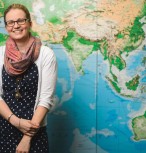DNA reveals the past and future of coral reefs
New DNA techniques are being used to understand how coral reacted to the end of the last ice age in order to better predict how they will cope with current changes to the climate. James Cook Univer

From 2005 to 2022, the main node of the ARC Centre of Excellence for Coral Reef Studies was headquartered at James Cook University in Townsville, Queensland (Australia)








Abstract: Policymakers need salient, legitimate and credible evidence on the social and ecological impacts of efforts to conserve global biodiversity. Fuelled by calls for increased rigor in documenting the impact of conservation interventions, a cohort of quasi-experimental studies has begun to quantify the impacts of conservation. The breadth and scope of these studies remains limited, focusing on data-rich geographies, indicators and interventions. To lay the foundation for evidence-based conservation across a suite of real-world contexts, pragmatic approaches to impact evaluation are needed, grounded in theory and ongoing experience that simultaneously provides scientific insights and site-level guidance. Key characteristics of this approach include the use of research designs that enable causal inference but which are robust to limited secondary data, the broad definition of outcome metrics to capture both intended and unintended impacts and the ability to explore variation in impacts across social groups and spatiotemporal gradients. In this presentation, Dr. Louise Glew (WWF-US) will draw on examples from across conservation policy and practice, including protected areas, community-based approaches, and certification schemes. This approach is sufficiently robust to inform efforts to document and explain social impacts across myriad interventions, sociocultural and biogeographic settings. In so doing, it offers a mechanism for generating salient, legitimate and credible insights on the impact of conservation efforts to inform policy and practice.
Bio: Dr Louise Glew is the Lead Scientist for Monitoring and Evaluation at World Wildlife Fund (US), where she manages WWF’s monitoring and evaluation portfolio. Louise’s research focuses on understanding the social and ecological impacts of conservation interventions in complex social-ecological systems. Her current collaborative research projects include: understanding the linkages between conservation and poverty; empirical on social impacts of marine protected areas in Indonesia; the incentives and barriers for mainstreaming impact evaluation to support evidence-based conservation; and developing novel analytical techniques for predicting the impacts of conservation interventions. In addition to her research portfolio, Louise leads the implementation of an innovative, integrated monitoring, evaluation and learning strategy at WWF-US, known as the ‘M&E Roadmap’. Before working with WWF, Louise conducted her Ph.D. research in northern Kenya, documenting the social and ecological impacts of community conservation in northern Kenya.
New DNA techniques are being used to understand how coral reacted to the end of the last ice age in order to better predict how they will cope with current changes to the climate. James Cook Univer
A new study on the effects of climate change in five tropical countries has found fisheries are in more trouble than agriculture, and poor people are in the most danger. Distinguished Profess
James Cook University researchers have found brightly coloured fish are becoming increasingly rare as coral declines, with the phenomenon likely to get worse in the future. Christopher Hemingson, a
Researchers working with stakeholders in the Great Barrier Reef region have come up with ideas on how groups responsible for looking after the reef can operate more effectively when the next bleaching
Abstract: As marine species adapt to climate change, their heat tolerance will likely be under strong selection. Individual variation in heat tolerance and its heritability underpin the potential fo
Abstract: The Reef Ecology Lab in KAUST’s Red Sea Research Center explores many aspects of movement ecology of marine organisms, ranging from adult migrations to intergenerational larval dispersal
Abstract: Macroalgal meadows are a prominent, yet often maligned component of the tropical seascape. Our work at Ningaloo reef in WA demonstrate that canopy forming macroalgae provide habitat for ad
Abstract: Sharks are generally perceived as strong and fearsome animals. With fossils dating back at least 420 million years, sharks are not only majestic top predators but they also outlived dinosa
Abstract: Connectivity plays a vital role in many ecosystems through its effects on fundamental ecological and evolutionary processes. Its consequences for populations and metapopulations have been
Abstract: Evolution of many eukaryotic organisms is affected by interactions with microbes. Microbial symbioses can ultimately reflect host’s diet, habitat range, and even body shape. However, how
Abstract: The past few years have seen unprecedented coral bleaching and mortality on the Great Barrier Reef (GBR) but the consequences of this on biodiversity are not yet known. This talk will expl